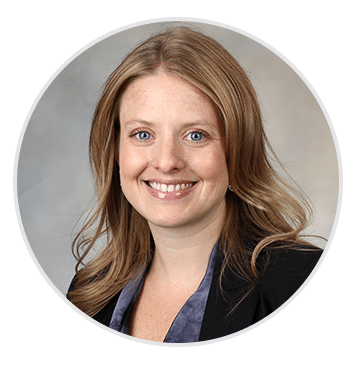Researcher Spotlight: Allison Rosenthal, DO
Mayo Clinic Arizona

Mantle cell lymphoma (MCL) can present in a variety of ways, from slow-growing indolent to more aggressive forms with poorer outcomes. Currently a patient’s treatment plan is largely based on patient age and overall health rather than biologic factors that predict the aggressiveness of their disease. A new tool, the MCL35 proliferation index, is being developed to risk stratify patients as being at low, intermediate, or high risk for poor outcome. Dr. Rosenthal’s LCRMP project seeks to validate this assay as a prognostic tool in older patients with MCL and ultimately in a clinical setting in a risk adapted trial with the hope that it can better personalize therapy. “In many other types of lymphoma, a better understanding of disease biology has driven practice change when it comes to selecting what we hope is the ‘best’ treatment,” Dr. Rosenthal says, “We have lagged behind in being able to do so for MCL. I’m hoping through this work … to better identify patients who might respond well to standard treatments versus those that are high risk for progress or failure to respond and have novel therapeutic options available from the start.”
Dr. Rosenthal received her DO from Midwestern University (Arizona) before a residency at St. Joseph’s Hospital and Medical Center. She completed her Fellowship at Mayo Clinic’s Arizona campus, where she also completed a special Advanced Fellowship in Lymphoma as a Mayo Clinic Scholar based at Memorial Sloan Kettering Cancer Center, and is currently an Assistant Professor with Mayo Clinic. Dr. Rosenthal says she is excited about participating in the LCRMP to improve her clinical research skills, as well as other skills such as grant writing and getting involved in collaborative research efforts. “I am certain that my participation in the LCRMP will serve as a springboard for my clinical research efforts and will be a setting in which I learn the important principles of designing and implementing a feasible clinical research project.”
A leukemia survivor herself, Dr. Rosenthal cites her patients as her reason for her passion for lymphoma research. “Just as I looked to my oncologist for hope and the expertise to know what to do in an unpredictable and vulnerable situation, I want my patients to feel confident that I’m doing everything I can to give them the best care possible, she says. “While being a lymphoma doctor allows me to celebrate a lot of success, there are still failures and as long as there are, I will continue to push boundaries, ask questions, and continue doing the research.

